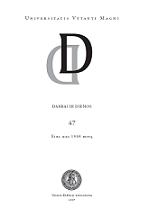Visuomenės ir tapatybių paieškos Czeslawo Miloszo individualiojoje epochoje
The search for community and identity by Czeslaw Milosz during the epoch of the individual
Author(s): Vytas JankauskasSubject(s): Language and Literature Studies
Published by: Vytauto Didžiojo Universitetas
Keywords: search; community; identity; Czeslaw; Milosz; during; epoch; individual;
Summary/Abstract: The object of this analysis is to outline the view that Czesfaw Mifosz held of the world, which has been referred to as the epoch of the individual. This paper also examines societal guidelines of identity. It appears that the beginnings of the Czesfaw Mifosz epoch might be sought in the seventeenth century when the culture of democracy among the nobility in the Grand Duchy of Lithuania was developing and Catholic tendencies were becoming stronger. At that time, attitudes of tolerance towards religious confessions were also forming. Geographic borders were changing constantly. For example, in the 17th century, the borders of the Grand Duchy of Lithuania changed whereas, in the twentieth century, it was those of the middle of Eastern Europe. Despite such societal changes, the values which formed in the seventeenth century survived throughout the period under discussion. Although repressed, the society was consolidated and it sustained itself until its split at the end of the nineteenth or beginning of the rwentieth century. Then a new subject of society appeared - the intelligentsia, born from the peasantry. At this time, the traditional values of the nobility were enclosed within the family. Such a state helped individu¬als adjust during the first stage of sovietization. Individual needs, valued during the times of the Commonwealth of Two Nations, were forced into the background. The search for identity was concentrated in the personality of Czesfaw Mifosz himself and his personal experiences. This search attempted to highlight the changes and traditions of the society, which generated new values in nineteenth century society preceding its splinter. While most values were changing, one underlying value, religion, was the exception. Furthermore, it had retained national characteristics. A construction of society based on religious communities could thus bring the elite closer to the general public.
Journal: Darbai ir dienos
- Issue Year: 2006
- Issue No: 46
- Page Range: 129-146
- Page Count: 18
- Language: Lithuanian

